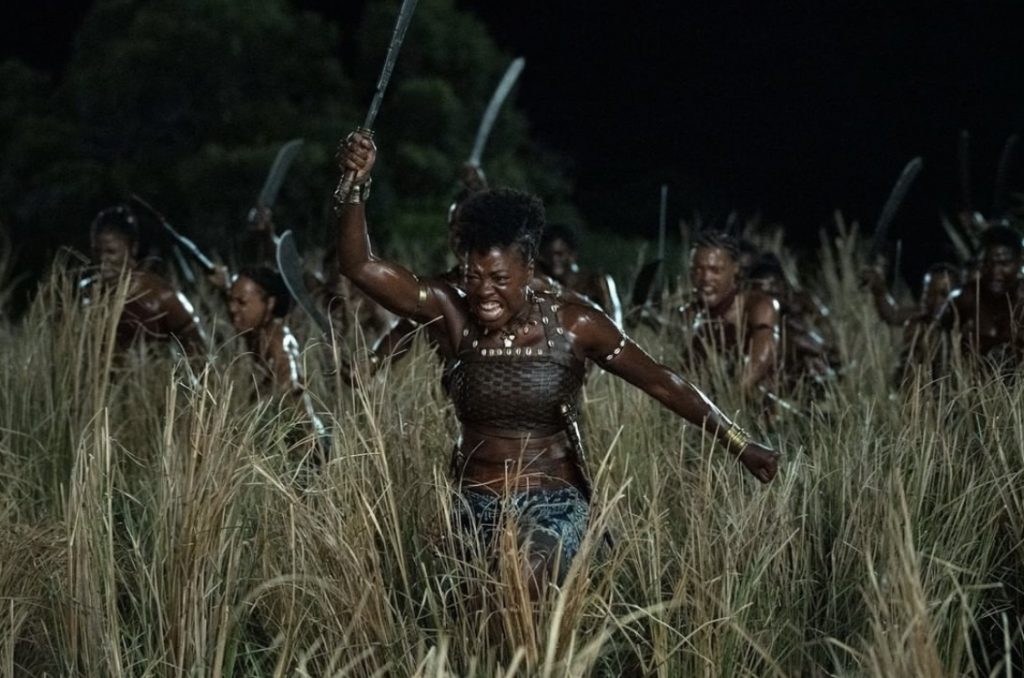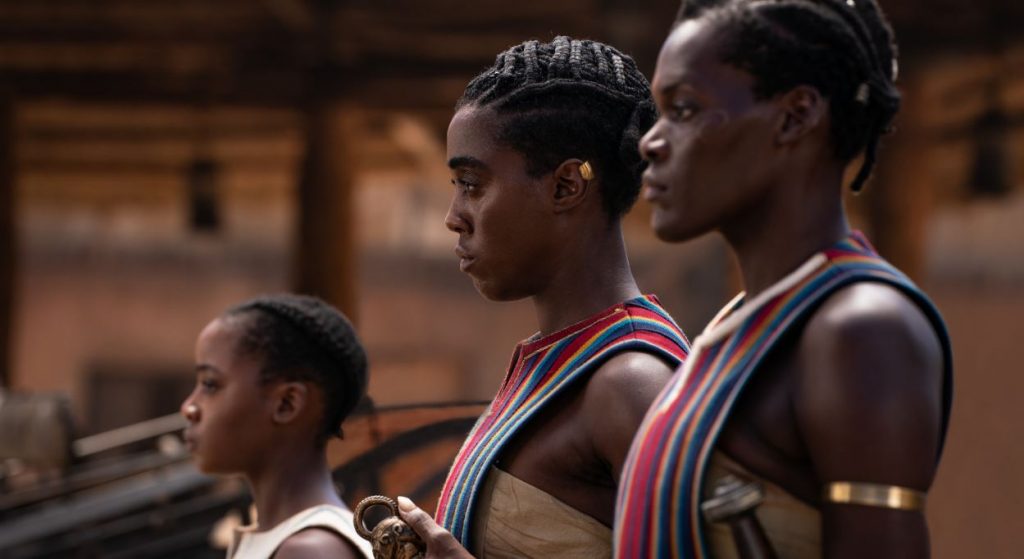In many ways, Gina Prince-Bythewood’s The Woman King is a fairly standard action blockbuster epic. It has a young hero who learns about a unique heritage. There are (wonderfully staged) battles. Characters include brave underdogs overcoming. It has revenge and empowerment. There is spectacle, melodrama, and romance. If you are looking for Hollywood, this gives you Hollywood.
The movie is set in the 1820s in the West African kingdom of Dahomey, and its action stars are all Black women. When you root for them, you’re not rooting to preserve the world we have in the face of some threat. You’re cheering on a different society altogether. The film insists that real empowerment can only exist in a world other than our own. That’s a strikingly radical message.
Fighting for Dahomey
As the film opens, Dahomey is at a crisis point. A neighboring empire obtained horses and guns from European traders. Its leader Oba Ade (Jimmy Odukoya), hungry for more enslaved people to enrich his kingdom, has started encroaching on Dahomey. A new Dahomey King, Ghezo (John Boyega), relies on a cadre of all-female warriors, the Agoje, to defend the kingdom. Ghezo also trades in slaves. But the leader of the Agoje, General Nanisca (Viola Davis), believes Dahomey can be stronger if it resists the poison of forced servitude.
We see these large-scale historical events mostly from the perspective of Nawi (Thuso Mbedu), a 19-year-old who refuses the series of old, rich, abusive husbands her father lines up for her. Exasperated, he disowns her and gives her to the Agoje. She’s determined to become a fearsome warrior like Nawi and the Agoje veteran Izogie (Lashana Lynch). But (like many a fresh-faced Hollywood soldier before her), she has a certain amount of trouble obeying authority and the chain of command.

There are almost infinite Hollywood films about a less powerful military force taking on a larger force and/or a seemingly impossible task with grit, nobility, and skill. Avengers: Endgame is an obvious example; Maverick is a more recent one. You don’t need spoilers to know, more or less, what the movie’s beats will be, or who will win.
The thing about Endgame and Maverick is that they’re both passionate defenses of our current status quo. Superheroes and flyboys defend the homeland from alien invaders or outsiders who want to make the world less safe. Change in these movies will make things worse. The good guys are good because they’re trying to keep things as they are.
The fight for Dahomey is also a fight to preserve. But what’s being preserved is not the world order we know. In fact, the encroachment of that world order—our current, modern world order—is what Dahomey is struggling against.
That means a rejection of slavery, obviously. But it also means a rejection of traditional gender roles, in which men are the primary warriors and white men the primary focus of narrative interest (still very much the case in both Endgame and Maverick.) It means rejection, too, of much of the imperial history of the last 200 years. To fight for Dahomey is to fight for a different nation.
More Wakanda than Wakanda
The success of Black Panther—a film celebrating an African nation with an elite female fighting force—probably paved the way for The Woman King. But in many ways, Dahomey is willing to take Wakanda further than Wakanda.
Black Panther was careful to include a token good white person—a CIA agent played by the earnestly pure-hearted Martin Freeman. It also took pains to reject revolutionary violence. The movie sympathizes with its villain, Killmonger (Michael B. Jordan), who wants a global Black revolution. But it ultimately has to put him down.
The Woman King, in comparison, is much less interested in compromising with standard mainstream narratives. The Freeman-like character, played by the sizzling Jordan Bolger, is a Brazilian man whose mother was kidnapped from Dahomey and whose father is Portuguese. He’s not there to help Dahomey but to be inspired by its example. His will they/won’t they relationship with Nawi embodies the beauty and romance of solidarity across a Black diaspora.

That solidarity includes an appreciation of Dahomey’s culture, with its joyful dancing and its women who adamantly don’t need European chivalry. Solidarity, though, also means embracing enough bloody violence to please even Killmonger. There are few choices when faced with the monstrous physical, sexual, psychological, and global violence of slavery.
Black Panther imagines a utopia nestled in Africa outside the currents of history, untouched by the ugliness of history. Nanisca, in contrast, looks with Viola Davis’ pained, tired, knowing eyes at the European nightmare of slavery and genocide on its way, and concludes the only possible response is sustained, desperate resistance.
The resistance is, supposedly, in the past. But it’s European slavery and colonialism that ended up shaping the present we live in. Dahomey is beautiful, courageous, and inspiring, but it isn’t where we’re living for the most part. If that’s the world we want, we must fight for it. Gina Prince-Bythewood makes a moving case that we should.


The different world worth fighting for? Ugh it’s depicting slave traders aa heroes when they are actually the villain in actual historical context. They weren’t fighting in adverse as if the dahommey empire was innocent. The British were attacked by the empire and the British were the ones that stopped abuse of slaves during the slave trade. I dont know how these writers can fix their pen to lie like that.